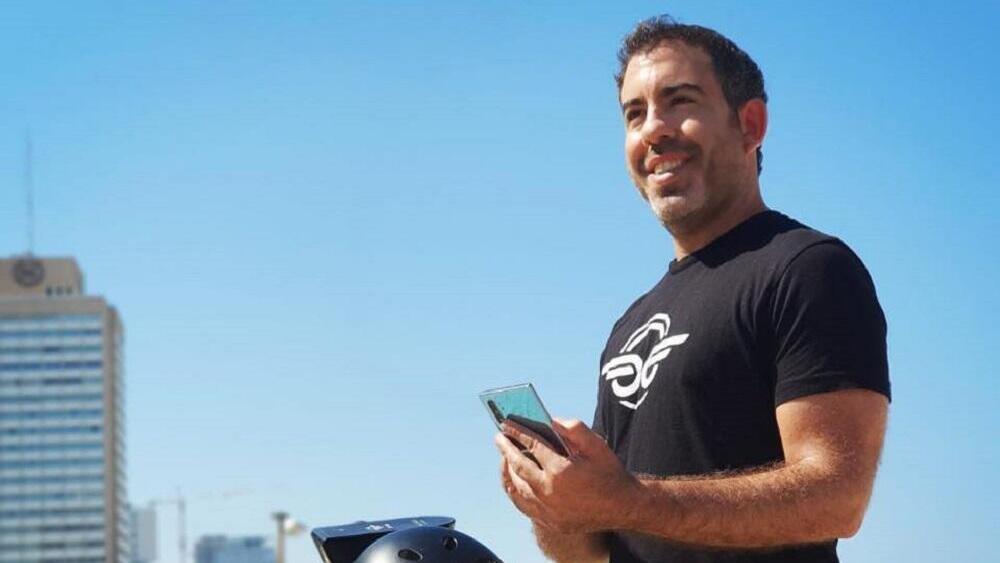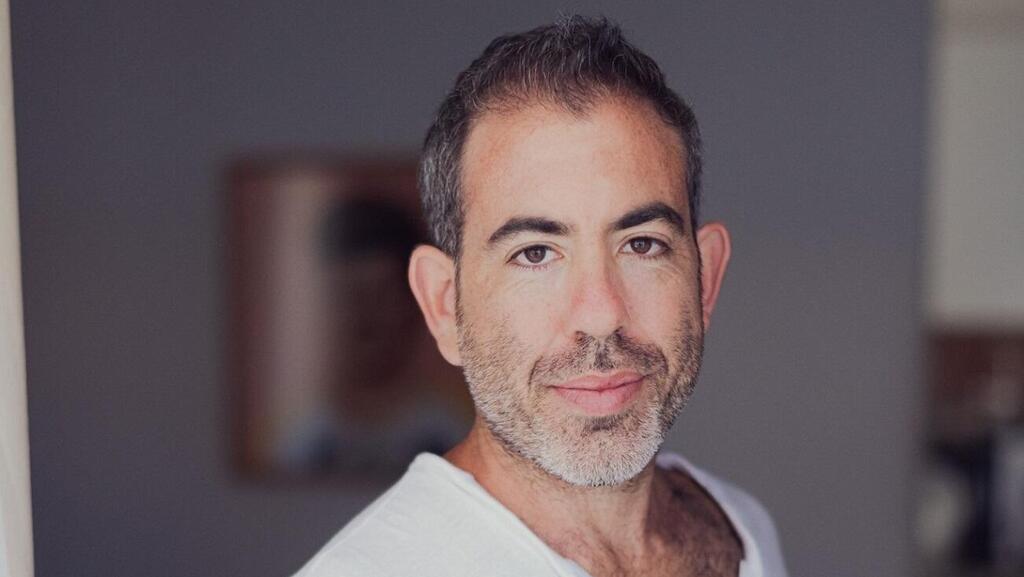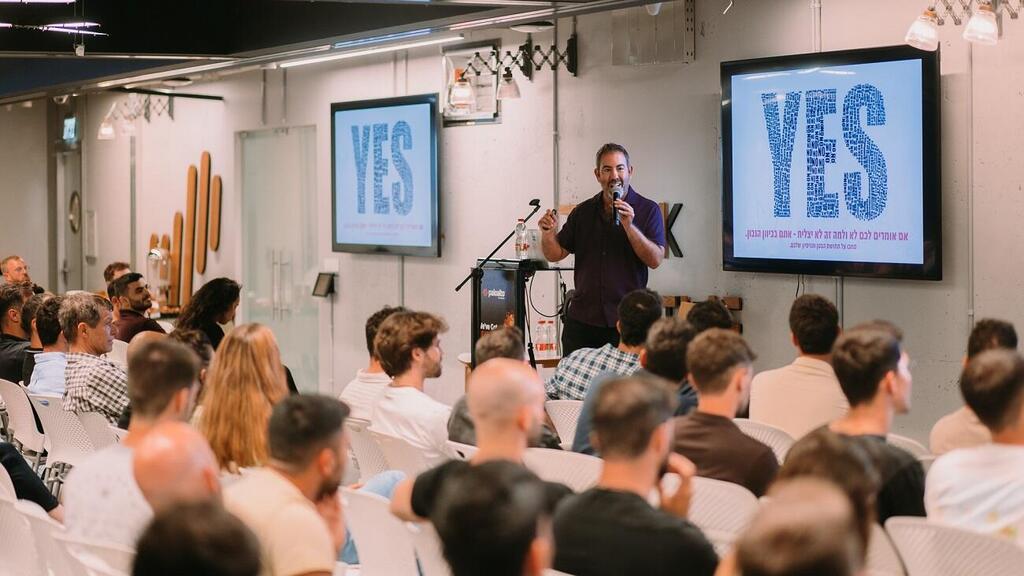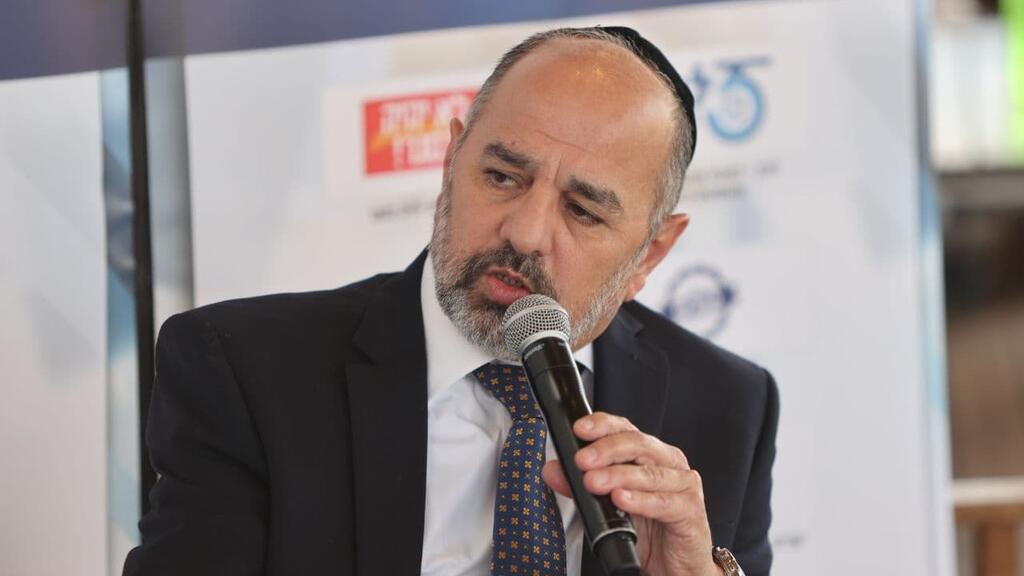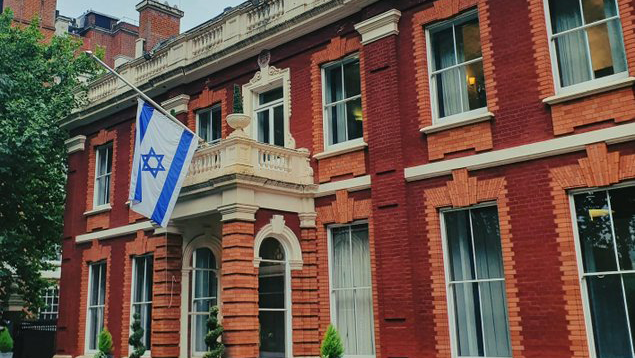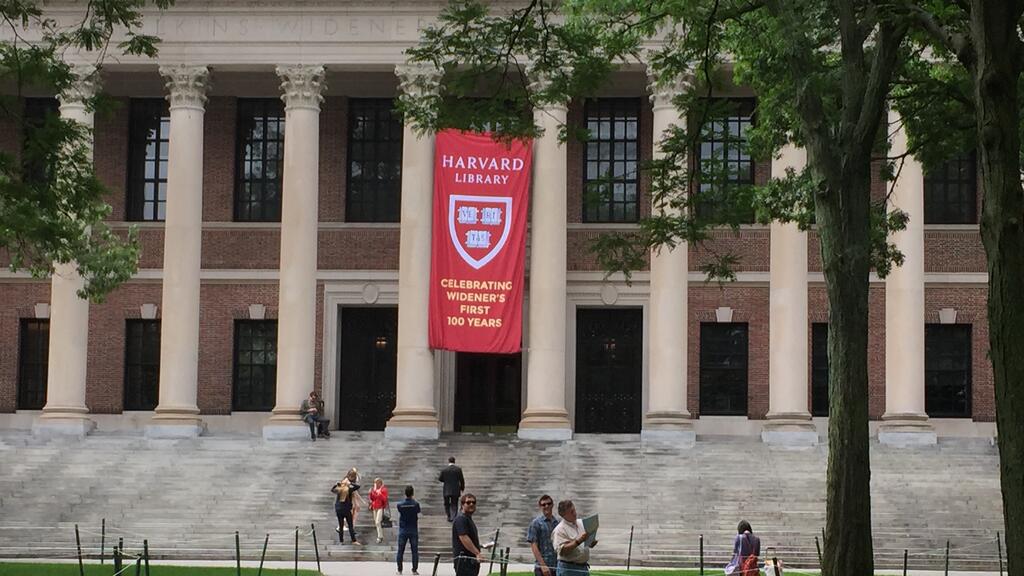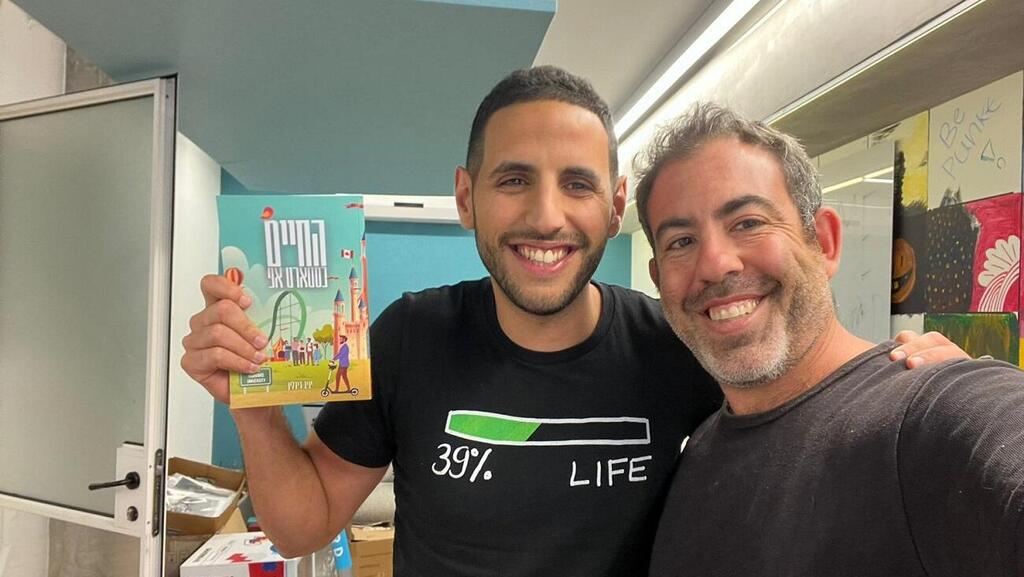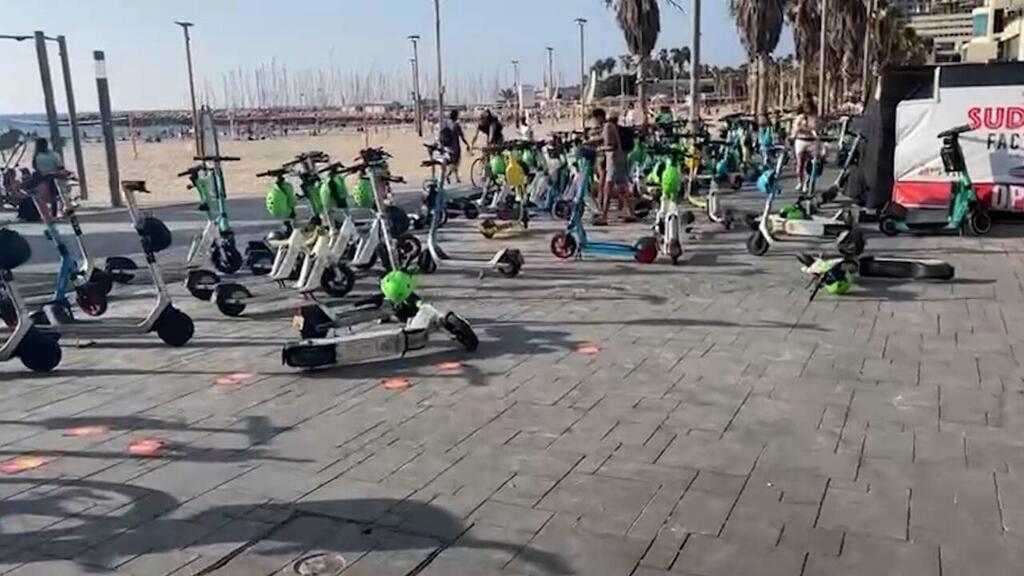Half of Tel Aviv hates Yaniv Rivlin and the other half thanks God for his very existence. On the one hand, many view the man who founded Bird Israel, the country’s Israel’s shared electric scooter company, as directly responsible for this annoying thing taking over the urban landscape.
This is what blocks your way on the sidewalk. It recklessly cuts you off as you’re walking down the street and it’s involved in no end of accidents and near-accidents. On the other hand, over half a million Bird subscribers can’t really remember what life was like before. For them this object, allowing them quick, efficient and accessible mobility in a city full of traffic jams and unpredictable public transport, is nothing less than a blessing.
Rivlin himself is used to being both abused and embraced. “People either love me or hate me,” he says with a smile.” People get very emotional when it comes to electric scooters. It’s like when the world moved on from horse-drawn carriages to cars at the beginning of the 20th century. This is how revolutions happen.
Over 30% of our rides replace journeys in private cars or taxis. Some 25% of the rides are to link up to public transport such as busses or trains. These journeys mean people are leaving the car at home. Some 35% of the rides take place between seven and ten in the morning and five and seven in the evening. People really are using them to get to and from work.”
And to run people over
“It’s clearly not ideal. It’s a process. It takes time. Every accident is a whole world, but you have to look carefully at the data. Compared to other modes of transport, the numbers of electric scooter accidents are much lower than those of other vehicles on the road. I’ll be the first to say that the electric scooter is a vehicle in every sense, and should be treated as such. Enforcement needs to change.“
Do you use an electric scooter?
"I’d never been on one before I founded the company. Now, I can’t get enough. It’s changed my life. It’s the best way to get around in an urban environment. Now, I can know exactly when I need to leave the house and when I’ll get to work. This is brand new. Bird has also proven to be good for small businesses as it makes it easy for customers to get to them. I get so much organizing done on a Friday morning on the scooter - in a matter of minutes.”
But we’re not here to talk about Bird. Not only because Rivlin left his position as CEO three months ago, but also because Rivlin’s path to the position of CEO is more interesting than the position itself.
He’s 40, married, father to a newborn child, and he currently lives in Tel Aviv. Until a certain point, his life sounds like a typical Israeli life story: He was born and raised in Katzrin in the Golan Heights, the eldest son of a middle-class family. His mother was an English teacher and his father works in a factory. He also has a younger sister.
He finished high school with mediocre grades, served in the army, went on a trip with his friends and then went to university. It’s unlikely that anyone meeting the teenage Rivlin could have seen a successful start-up in his future, or that he’d be accepted to Harvard, the world’s top university. But that’s exactly what happened.
He tells his story in a recently released autobiographical book, “Life as a Start-Up,” full of tips for personal and business growth. His name gracing the book’s front-cover is at odds with the information his books opening comments: “As a child, I was diagnosed with both dysgraphia and ADHD,” admitting “I never thought I’d write a book.”
Nevertheless
“Someone said to me ‘You know a lot of interesting things. You talk to people as equals. Maybe you should write a book and share all this knowledge.’ I told her it was a great idea, apart from the fact that I can’t write. She told me about “ghostwriters.” I had no idea there was such a thing. When I was young, I read Shimon Peres’s autobiography and I remember naively wondering how such a busy man had the time to write a book."
"So, a ghostwriter wrote my book. I write this plainly in the book, so people will know it can be done – that you don’t need to be a writer. For a year, we’d meet up for three hours every Sunday. It was a crazy kind of process.”
In between the chapters, written frankly, and in the first person, you’ll find chapters written by other persons of interest including artistic gymnast, Neta Rivkin, social entrepreneur, Adi Altschuler and musician, Doron Medalie. “They’re friends from various points in my life. I know them all personally. Some people I asked didn’t want to write for the book, but I’m not telling you who they are!”
But let’s start at the beginning: Following an ordinary childhood in Katzrin, Rivlin was conscripted and served in the 869th “Shachaf” Combat Intelligence Battalion.
“In the army, I met people from all over the country. It was an amazing experience. I learned a lot. It’s important for me to tell young people that you’re in the system for the next two to three years. As you’re already in, take full advantage of it. They sent me for an operational driving course and paid for me to get a 'gimmel' license to drive a truck. I did the squad commanders’ course too. I was a troop sergeant. I learnt all kinds of crazy stuff. While still in the army, I built up things that would serve me in the future. I obviously didn’t realize that at the time. I only understood in hindsight.“
Toward the end of his army service, he decided he wanted to study at university, took the psychometric tests and was met with rejection – the first of many. He got a 542 score, which is exactly the Israeli average for the test – and not good enough to be accepted by faculties such as law, medicine or psychology.
“For years, I was ashamed of that score. I kept it quiet. The closest place I could take the test was in the Krayot. To get there, I had to get up at five in the morning. Just getting there shows how committed I was. Then, the university informed me that they wouldn’t take me because I got 542 and not 544. It made no sense. We’re much more than a number in a test.
"Scores should definitely be part of the admission process for higher education, but it shouldn’t be based just on numbers. People don’t start out in the same place. And they don’t look at what’s really important – who the person is, what path you’ve taken, what journey you want to take. No one even talks to you.”
After his military service, he went to a Jewish Agency summer camp in California and then onto Canada and, like any good Israeli, worked selling Dead Sea products in the malls.
“I worked in one of Toronto’s biggest malls. That’s where I learned how to sell. I realized I was good at it. Knowing how to sell is key to success. Empathy is important. To sell well, you have to be empathetic. Selling starts with knowing how to sell yourself. When you go to a job interview, or when you write a letter applying for studies, you’re being asked to tell your story empathetically and touch the other person’s trigger points. That’s what makes the connection. “
Following a glowing career selling Dead Sea creams to passers-by in the mall, he went on to the "traditional" trip to South America, then back home to Israel to start his Bachelors’ program. With rather modest matriculation exam scores, his options were either Emek HaYarden Regional College close to his home, or the Hebrew University in Jerusalem.
“Studying close to home would have been more convenient. I could have saved up by living at home with my parents At the last moment, I decided on the Hebrew University. What I really wanted was PPE (Politics, Philosophy and Economics), but I wasn’t accepted."
"I decided, or to be more precise it was decided for me, that I should study Political Science and Sociology. As our universities are all about supply and demand, and not a lot of people want to study these subjects, the admission requirements aren’t very high - so I got in. Leaving my comfort zone in the north of the country was definitely the right decision. “
His studies at the Hebrew University were an important point in his journey. “If life’s an amusement park, university’s the place with the best rides.“
Give me an example of a great ride
“Apprenticeships. Unfortunately, it’s not really developed enough in Israel. In America, it’s basic. Everyone does some kind of apprenticeship during their studies. Israelis start their BA program at a later age. They need to support themselves and don’t really have time for much more. There was an apprenticeship program at the Hebrew University.
"I chose to go to the Knesset. My political views are centrist. As the program was only one day a week for just one year, I decided to go for something not obvious, something out of my comfort zone. I was a parliamentary aide to then-Shas Chairman Yaakov Margi, who later served as religious services minister. I worked for him for a year for no pay. It gave me so much.
"Margi wrote my letter of recommendation for Harvard. Getting into Harvard is very much thanks to him. To be accepted for studies overseas, they want to see that you can leave your comfort zone and what you chose to do in your spare time.”
How did you work with him? You don’t have the same values or worldview.
“I’d never be his full-time parliamentary aide. I only went for it because it was for a limited time period. I learned amazing things. I was responsible for all legislation. I got to know a whole world, a whole sector of the community that I’m not part of, and an influential man who thinks differently from me. But there were things that connected us.
"I acquired a toolbox that has served me in the long-term. I got to write up a bill for building the Third Temple. Spoiler: It hasn’t happened yet. The Haredi parties only have two aides. One of them is also always the driver, so I was a driver too. I was entrusted with much more responsibility than my friends who did their apprenticeships for Shelly Yachimovich etc."
In his second year, Rivlin took part in a OneVoice (later known as “Darkenu”) leadership program. Darkenu works to promote the voice of the moderate majority in Israel and the Palestinian Authority, aiming to bring an end to the conflict.
He was later selected to represent OneVoice for a lecture series in Washington. Aged 25, he was staying in luxury hotels, meeting members of Congress and talking to audiences about growing up in the Golan Heights and his IDF combat service.
Rivlin’s secret to success seems to be a combination of actively looking for opportunities and taking full advantage of them, and a remarkable ability to accept rejection and just carrying on. For example, he applied for the “Atidim” public sector program and was rejected. He then applied for a leadership and diplomacy program via the American organization, StandWithUs.
He wasn’t accepted to that either. He reapplied the following year. This time, he was accepted and graduated the course with excellence. This excellence earned him a three-month internship at the Israeli Embassy in London – all paid for by the program.
How do you manage to overcome failure and just pick yourself up again?
“To be honest, I don’t know. I’ve faced a lot of rejection in my life. A lot of people have also tried to stop me doing things. When I wanted to set up Bird, I was told: ‘Forget it. Israelis won’t pay for electric scooters’, or ‘Israelis are vandals. They’ll steal all the equipment on the first day.’ So that’s what they said. They didn’t go for it. So what? Why shouldn’t I try again? What’s the alternative? How would it help telling myself ‘They didn’t accept you. Give up’? I’d just feel disappointed.”
What’s your best piece of advice to students?
“To actively look for scholarships, the sooner the better. Take full advantage of your own strengths. I’ve never paid a penny for my studies. I’ve always found scholarships. It’s also important to understand that things don’t just come your way. You have to work at it. I was in a combat unit and I grew up in Israel’s periphery.
"I took full advantage of these things to get a scholarship through Mifal HaPais (Israel’s National Lottery) when it had only been going for a year. Only a thousand people applied and all thousand received scholarships. I just found it at the right time. The scholarship meant I could concentrate on my studies and didn’t have to think about how to pay for them.
“Go for the things that are just starting out. In Start-Up, the risk element is higher because you don’t know where it’s going, but the chances of success are also infinitely higher. I was accepted to the OneVoice program because it was in its first year. If you get into a company that’s just getting started, you have a better chance of developing and getting ahead in the company. If you join Microsoft or Intel now, it’ll be some time before you advance in the company. “
When he graduated, he didn’t know what he wanted to do in life, but he carried on trying to get onto highly coveted programs that were fully subsidized - and carried on getting rejections. His next stop was the Suave Scholars program in Canada which aims to create strong leaders worldwide.
Over a thousand hopefuls apply annually for the program. The 12 successful applicants selected for the program get to live - all expenses paid - in a castle in Montreal. Rivlin applied at the same time as his good friend, journalist Tomer Avital. Avital was accepted and Rivlin was rejected. He did what he always does in the face of rejection – he tried again.
He was accepted the second time, along with young people from everywhere from Rwanda to Afghanistan. With a university mentor, they each worked on a social project. World leaders, including Clinton and Trudeau, dropped by at the castle.
Rivlin took full advantage of this platform, embarking on tech and social entrepreneurship. He founded a company creating toolbars for nonprofits, which helped raise funds and build a community. The road to Harvard was being paved...
“In the castle in Canada, someone studying at Harvard said to me ‘Come study at Harvard.’ I remember thinking ‘Me? Harvard?’ She encouraged me and said she’d help me write a letter of application and promised me that I could it.”
She was right. You got in.
“Correct. I want to encourage anyone who’s hesitant about applying for studying overseas – just apply. You might get accepted. There are a couple of things that people don’t know about Harvard."
“Firstly, you’re not judged just on your scores and grades. Israelis’ experiences in the army are something that not everyone has. We treat it as trivial because everyone around us does it. Leading a group of 30 in the field in very precarious conditions at the age of 18 makes sense to us, but they rather admire and respect it.
“The second thing is that for a BA program at Harvard, all you have to do is apply and be accepted. They don’t ask you about your socio-economic circumstances. They don’t know what they are. If they’re not very good, you’ll automatically get a full scholarship. People say to me ‘Why should I even try applying? How could I possibly afford it anyway.’ With the exception of those born into rich families, most Israelis get a full or very large scholarship.”
But, Rivlin wasn’t trying to get onto a BA program. He was going for a Master’s degree program, so there was still the question of how to fund it.
“A friend of mine told be about a scholarship from the Jewish community in Saint Paul, Minnesota. The scholarship’s given to one Israeli each year who’d been accepted to study Political Science, Public Policy, Economics and Law. I said to myself ‘One Israeli? It’s a long shot, but I’ll give it a go.’ Luckily, very few students applied because not a lot of people knew the scholarship even existed.
"Only a few dozen made it to the final selection stage. They called me to set up an on-line interview. I just asked if I could come in for an in-person interview. They said ‘Listen. No one’s ever done that, but if you really want to, feel free to pay for your own ticket and come.’ So, I paid $500 out of my own pocket and physically showed up.”
Why did you want to show up in person?
“Because there’s nothing like physical connection. It’s stronger than anything online. I was definitely going to be better live. I also wanted to distinguish myself from other applicants. I wanted them to remember me. It was winner-takes-all, so I need to do everything I could do to increases my chances. I got to Minnesota in December. It was -30°C outside. It was freezing. I stayed at a motel and didn’t leave the room. I went to the interview and got the scholarship that was worth $100,000. I invested $500. It was a good deal.”
Rivlin resigned from the company he founded in Canada (“you have to choose”), and devoted himself to studying at the world's top university.
What’s so wonderful about Harvard?
“The first thing that really impressed me was the that our introductory talk for the management program was with the head of the Harvard Alumni Association. She gave me the feeling that I was part of a community, something much bigger than myself. I immediately felt connected to the place.”
“Secondly, Harvard answers your intellectual needs. There’s no such thing as something not being there. If they don’t have it, they create it. Let me give you an example: It was 2011, the year of the Arab Spring. At Harvard, the moment they realize that something significant is happening in the world, they’ll immediately set up a course about it.
"So, they started the 'Arab Spring’ course where, with guest lecturers, we discussed a different Arab country each week. There was a Qatari prince in my class. Miraculously, they put us together to prepare a piece of work on how to bring about World Peace. I found myself talking about Syria, ten minutes from where I was raised, but that I was forbidden to visit."
"Nothing can compare to this as an experience. The intellectual stimulus is what Harvard is for me. Everything really is laid out in front of you. They have the best lecturers, and presidents and heads of state from all over the world come address the student body, which is extremely diverse. Ethiopia’s Minister of Security was in one of my classes, and we talked about leadership dilemmas in his country.
"I was 27. I made amazing connections there. Studying there, and having it on my résumé has given me a lot of self-confidence. When I enter a room and I mention I went to Harvard, I’m not saying I’m smarter than other people – but it gives you a certain presence.”
His Harvard Masters’ thesis was practical rather than research-based. Rivlin chose to do his thesis by consulting the Schusterman Foundation on business and social entrepreneurship in Israel. It culminated in a concrete job offer.
They parted ways five years later. Rivlin moved onto the next thing. Although he had five job offers, Rivlin decided that the next thing would be to make Tel Aviv the world’s electric scooter capital.
“In April 2018, I was sitting in Tel Aviv on the corner of Dizengoff Street and Ben Gurion Boulevard with Sam Rosen, a leading LA entrepreneur. We were chatting and watching the privately owned scooters passing by. He suddenly said ‘Three months ago, they founded a shared scooter company in LA. It’s called Bird.’ I said it sounded like a great idea for Israel.
"He hooked me up and the rest is history. If that had happened any later, it wouldn’t have happened at all. They wouldn’t have taken me because at the time I didn’t really have enough experience. Branch managers today have to go through eight interviews.
"I had one interview overlooking a canal in Amsterdam and another over a bottle of Rosé. I wrote a Word document about why Israel was the right place and that was enough. All because it was only three months after the company was founded. I had the right timing.”
What did you want to be when you were a boy?
“The head of Foreign Affairs Ministry. When I finished my degree, I applied for the Ministry for Foreign Affairs’ cadet course.”
And what happened?
“They didn’t take me. Clearly.“


